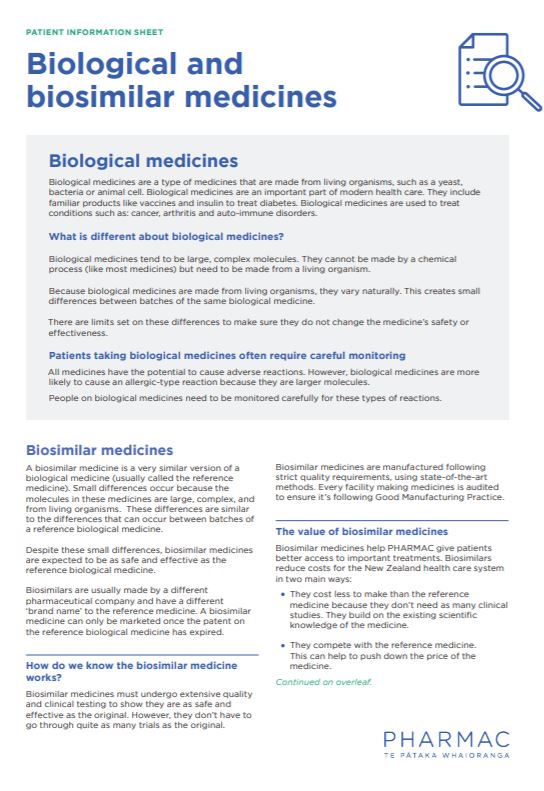You can now add Healthify as a preferred source on Google. Click here to see us when you search Google.
Biologics and biosimilar medicines
Key points about biologics and biosimilar medicines
- Biologics (or biological medicines) are used to treat many chronic conditions, eg, arthritis, inflammatory bowel disease, psoriasis and cancer.
- They work on specific proteins in your immune system that cause inflammation and damage, rather than suppressing your entire immune system.
- Unlike most traditional medicines that are made through chemical processes, biologic products are made from living sources like yeasts, bacteria, plant or animal cells.
- A biosimilar medicine is a very close, but not identical, copy of the original biological medicine that's already in use.
- This page provides more information about biologics and biosimilar medicines.

Biologics, also called biological medicines, are used to treat a variety of conditions such as certain cancers and auto-immune conditions (eg, arthritis, inflammatory bowel disease, psoriasis). Biological medicines also include products like vaccines, insulin to treat diabetes and hormones, eg, human growth hormone.
- Unlike most traditional medicines that are made through chemical processes, biologic products are made from living things, eg, yeasts, bacteria, and plant or animal cells.
- They usually have a more complex structure than other medicines.
Examples of biologics (and biosimilars)
The following are examples of biologics used to treat auto-immune conditions such as arthritis, inflammatory bowel disease and psoriasis. When biosimilars are available, these are included in brackets.
- Adalimumab (Amgevita, Humira)
- Etanercept (Enbrel)
- Infliximab (Remicade)
- Rituximab (Mabthera, Riximyo)
- Secukinumab (Cosentyx)
- Tocilizumab (Actemra)
- Ustekinumab (Stelara)
- Upadacitinib (Rinvoq)
- Vedolizumab (Entyvio)
How do biologics work?
Biologics used for auto-immune conditions and cancer work on controlling your immune system. They work as an immunosuppressant because they dampen the immune response. Biologics target specific proteins or pathways that cause inflammation and damage, rather than suppressing the entire immune system.
- Biologics are usually used for moderate to severe disease, when other immunosuppressants or steroids haven't worked well to control symptoms or flare ups.
- Not all biologics block the same proteins involved in inflammation. For example, some block an inflammatory protein called TNF, while others block B cells and interleukin. They are called TNF inhibitors, B cell inhibitors and interleukin inhibitors.
- Even with several options, sometimes finding the best biologic for your condition can be tricky because inflammatory diseases are often influenced many factors.
- That’s why one biologic may work well for some people but not for others. Also, a biologic may work for you at first but then stop working after a while.
- If the first one you try doesn’t work, or stops working for you, your doctor may suggest a different biologic.
- Some are taken by injection under your skin, and some by intravenous (IV) infusion (through a drip into a vein in your arm). A few biologics are available as tablets.
A biosimilar medicine is a very close, but not identical, copy of the original biological medicine that's already in use.
- It isn’t identical because biological medicines are made from living things, and living things are never exactly the same.
- Also, biosimilar medicines are highly sensitive to changes like temperature and pressure during manufacturing. This can lead to slight differences from the original brand.
- These differences don’t affect how the medicine works. Biosimilar medicines have been tested and shown to be as safe and effective as the biological medicine they're based on.
- In Aotearoa New Zealand, all biosimilar medicines must be approved by Medsafe.
How to they compare?
Compared to their original biological medicines, biosimilars:
- are made with the same types of living sources
- have the same strength and dosage
- are given the same way (eg, as a tablet, or as an injection)
- have similar potential side effects
- are less expensive.
Video: Understanding biologics and biosimilar medicines
Credit: Canopy Cancer Care
The high cost of some biologic medicines means that they are often not affordable for patients or funders. Biosimilar medicines offer competition, reducing costs and improving access for patients to these important medicines.
Biosimilar medicines are used extensively overseas including Austria, Germany, Greece, and Sweden. Australia and New Zealand regulators have also approved biosimilar medicines for use.
See biologic medicines(external link) for more information.
Biological and biosimilar medicines(external link) PHARMAC, NZ
Biosimilar medicines – the basics(external link) Department of Health, Australia
Biosimilar medicines – the basics for health care professionals(external link) Department of Health, Australia
Brochures

PHARMAC, NZ

Department of Health, Australia, 2017

Department of Health, Australia, 2017
Credits: Sandra Ponen, Pharmacist, Healthify He Puna Waiora. Healthify is brought to you by Health Navigator Charitable Trust.
Reviewed by: Angela Lambie, Pharmacist, Auckland
Last reviewed:
Page last updated:





